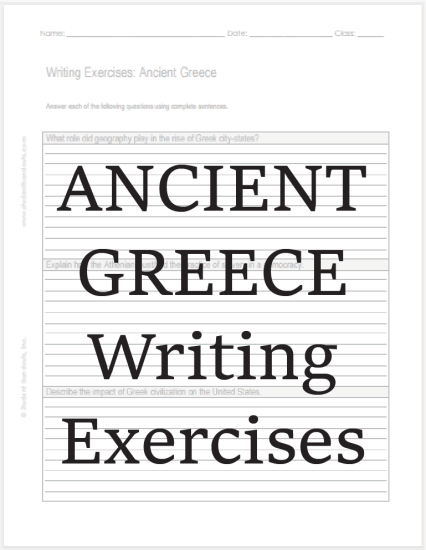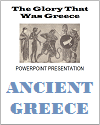| Ancient Greece Essay Questions |
|---|
| www.studenthandouts.com > World History > Ancient Greece > Ancient Greece Worksheets |
 |  |
|---|
|
Essay Questions: 1. What role did geography play in the rise of Greek city-states? 2. Explain how the Athenians justified the practice of slavery in a democracy. 3. Describe the impact of Greek civilization on the United States. Click here to print. Answers will vary. The justification for the practice of slavery in ancient Athens, a democracy, was rooted in several beliefs and social norms of the time. While it might seem contradictory to have a democratic government alongside a system of slavery, the Athenians reconciled these two aspects of their society based on the following justifications. Economic Necessity: Athenians believed that slavery was essential to the functioning of their society. Slaves were responsible for performing labor-intensive tasks, including agriculture, mining, and household chores. This labor freed up Athenian citizens, particularly those eligible to participate in the democratic process, to engage in public life, serve in the military, and participate in the governance of the city-state. In their view, without slavery, the economic and social structures of Athens would not be sustainable. Social Hierarchy: The ancient Athenians, like many other societies in the ancient world, believed in a hierarchical social structure. Slavery was seen as a natural part of this hierarchy. Citizens considered themselves free and entitled to participate in the democratic process because they were not enslaved. The concept of freedom for some was dependent on the existence of slavery for others. Cultural Precedent: Slavery was a deeply ingrained part of the ancient Greek and Mediterranean culture. The Athenians, like their contemporaries, accepted slavery as a common practice that had existed for generations. They did not question its morality or necessity to the same extent that modern societies do. Ethnic and Cultural Bias: The Athenians, like many ancient societies, often associated slavery with specific ethnic or cultural groups. Slaves were often captured in wars or came from regions outside of the city-states. The practice of slavery was rationalized by dehumanizing those who were enslaved, viewing them as inferior or less civilized. Our word barbarian comes from Greek, and its original meaning meant anyone who was not Greek. When conceptualizing this cultural bias, students should keep in mind that it had essentially nothing to do with races as they are conceived of today; the Greeks considered even their close neighbors to be barbarians, despite no noticeable physical differences. Role of Women: In addition to the institution of slavery, the status of women in ancient Athens was also heavily restricted. Athenian women, like slaves, were not allowed to participate in the democratic process. The exclusion of women and slaves from political life was a reflection of the prevailing patriarchal and hierarchical values of the society. It is important to note that while the Athenians practiced democracy, it was a limited form of democracy. Only a fraction of the population, primarily male citizens, were allowed to participate in the democratic processes. The rights and privileges of citizenship were not extended to women, slaves, or foreign residents. While these were the justifications put forth by the Athenians to reconcile democracy and slavery, it is essential to recognize that these arguments are products of their time and do not align with modern principles of equality and human rights. Slavery was a deeply problematic institution, and its existence within a democratic framework highlights the contradictions and complexities of ancient Athenian society (as well as of the democracy of the United States for nearly a century after its founding).. |
|---|
| Ancient Greece Books and Films | Ancient Greece Outlines and PowerPoints |
| Ancient Greece Maps and Pictures | Ancient Greece Study Games |
| Ancient Greece Miscellany | Ancient Greece Worksheets |
| www.studenthandouts.com > World History > Ancient Greece > Ancient Greece Worksheets |









